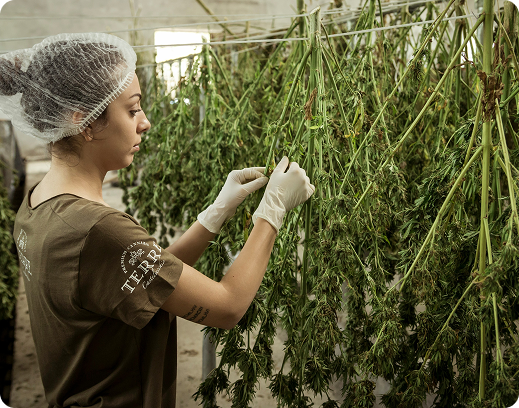How to Open a Dispensary in Montana
Embark on a successful journey in the cannabis industry with our comprehensive guide on opening a dispensary in Montana. Gain expert insights, navigate licensing, and unlock the keys to achieving dispensary success.
Both medical and recreational cannabis are legalized throughout Montana, which makes it just as ideal of a location for any cannabis entrepreneur as any other state. The opportunities and viabilities look promising, but you must make well-informed decisions about various aspects of the cannabis startup.
Here’s a comprehensive guide regarding everything you need to know before opening a cannabis dispensary in Montana.

Why Start a Cannabis Business?
Opening a dispensary offers immense opportunities:
-
High Demand
With the growing acceptance of medical and recreational cannabis across multiple states and countries, dispensaries are seeing a surge in demand. Consumers are increasingly looking for high-quality products for health, wellness, and leisure, creating a constant need for reliable, accessible dispensaries.
-
Job Creation
The cannabis industry is projected to create thousands of jobs across various sectors, including cultivation, retail, logistics, and marketing. This growth not only provides employment opportunities but also contributes to local and national economies.
-
Strong ROI Potential
Entrepreneurs who navigate the complex regulatory landscape can make big returns on their investments. With proper business planning, branding, and compliance, dispensaries can tap into a rapidly growing market with high-profit margins.
Types of Dispensary Licenses in Montana
In Montana, two distinct dispensary licenses are available based on the intended operation and target market. These license types include:
- Medical License: This license type allows entrepreneurs to sell marijuana and marijuana products to registered medical marijuana patients (or cardholders) in compliance with the Montana Medical Marijuana Program.
- Adult-Use Dispensary License: Also known as a “recreational dispensary” license, this allows businesses to sell cannabis products to either registered cardholders or adult-use consumers.

Importance of Customer Service and Education
- Customer Experience: Every successful dispensary finds its foundation in great customer service. The staff should be very well informed, amiable, and able to recommend specific products for customers with particular needs.
- Educational Resources: One would be able to help customers make certain decisions in regard to what they will buy by providing educational resources and information seminars. This helps ensure customer satisfaction and makes your dispensary a valuable asset to the community.
Other Types of Cannabis Licenses in Montana
If you are looking to invest in other areas of the cannabis industry, the following are a few types of cannabis business licenses for you to consider:
- Cultivator licenses: Allows a licensee to cultivate marijuana for medical or adult use.
- Manufacturer licenses: Allows a licensee to convert or compound marijuana into marijuana products, concentrates, or extracts, and to package, repackage, label, and relabel products.
- Transporter licenses: Allows a business to transport marijuana and marijuana products between licensed marijuana facilities, including testing laboratories, or to medical registered cardholders. Transporters are not allowed to deliver to adult-use consumers.
- Testing Lab licenses: Allows a marijuana testing laboratory to provide testing of representative samples of marijuana and marijuana products and to provide information on its chemical composition.
- Combined Use licenses: These are special licenses specifically for Montana’s 8 federally recognized tribes and/or entities majority owned by one of those tribes.
Each type of license has specific application requirements, procedures, and fees. Check the requirements for your desired license type to ensure a smooth application process.
Application Process for a Dispensary License
Entities interested in obtaining a dispensary license must apply through Montana’s TransAction Portal. Below are the general steps in the application process:
- Preparing the Application: Gather all necessary documentation and information required for the application, such as business plans, financial records, security plans, and ownership information. Ensure that you’re compliant with all General Licensee Requirements and Additional Application Requirements for cannabis dispensaries, as outlined by the Montana Department of Revenue and other relevant authorities.
- Submission of Application: A well-drafted application is accurate, detailed, and provides all necessary information. Remember that a completed application will elevate your chances of getting the license and reduce waiting time.
- Background Checks: Applicants and key individuals associated with the dispensary will undergo thorough background checks to ensure compliance with state regulations. This includes consent to fingerprint, documentation of residency, documentation of Date of Birth (DOB), and documentation of property ownership or owner permission, etc.
- Site Inspections: Since a business can only apply for one dispensary license but choose several locations for multiple dispensaries, the Montana Department of Revenue must inspect and approve all locations before business operations begin.
- Approval and Licensing: If the application meets all requirements and passes the necessary checks and inspections, the Montana Department of Revenue then issues the dispensary license.
Note: New applications for Cultivators, Dispensaries, and Manufacturers will not be accepted until July 1, 2025.
Application Process
Required Documentation for a License
The following documents are required for a dispensary license application in Montana:
- Documentation of Montana Residency
- Documentation of Date of Birth
- Consent to Fingerprint
- Documentation of Property Ownership or Property Owner Permission
- Business Organization Chart
- Business Structure Form
- Source of Funding Verification
- Building Inspection Report
- Fire Inspection Report
- City and County Approval
Visit the Montana Department of Revenue website to learn more about each of these documents and relevant forms.
Timelines for Obtaining a License
While the Montana cannabis authorities haven’t specified a period for getting a cannabis dispensary license, on average it takes several months between initial application and final license issuance.
The timelines can vary according to several factors, such as the completeness of the application, the efficiency of the licensing process, and any potential delays in background checks or site inspections.
Please note that new applications for cultivators, dispensaries, and manufacturers will not be accepted until July 1, 2025. Meanwhile, renewal applications for cannabis business licenses are available 75 days before expiration. Applications must be submitted 60 days before expiration to allow for necessary inspection and processing.
Financing and Business Plan for a Dispensary
The crucial step in getting a cannabis dispensary license is to develop a business plan, which will be used to secure the necessary financial resources. A solid business plan is one of the most essential tools in an entrepreneur’s toolkit. In general, your cannabis business plan should include the following:
- The physical location of your dispensary
- Funding plan, or the source of your startup and ongoing capital
- Sourcing plan for procuring cannabis products
- Revenue projections
- Estimate or actual number of employees
- Diversity and equity plans
- Marketing plan
- Safety and security plan
- Technology plan
- The insurance company you will be opting for
- Business organization chart
- Business structure form
- Other relevant information you want to document
A well-crafted business plan is essential for the success of your business. It contains all the necessary information to present to potential investors and lenders, outlining the steps you will take to start and expand your business. Agencies like the Small Business Administration (SBA) can help you find funding sources from private companies or banks if you need help getting it.
Overall, while developing your business plan, ensure that you follow Montana dispensary laws and do not include anything that goes against the rules and regulations.
Types of Financing Available
Securing the right financing is a crucial step in opening a dispensary, and aspiring owners in Montana have several options to consider:
- Self-funding
- Traditional business loans
- Private investors
- Cannabis-specific lenders
Risk Management Plan
A risk management plan is crucial for a dispensary to identify and mitigate potential risks and uncertainties. It assesses regulatory compliance, security vulnerabilities, market competition, and operational risks. It also outlines strategies to minimize these risks, such as contingency plans, insurance coverage, robust security measures, and compliance protocols.
A well-developed risk management plan enhances business resilience and safeguards against potential setbacks or liabilities. Here are some key elements that should be included in a risk management plan for opening a dispensary in Montana:
| Risk Category | Description |
| Compliance Risks | The risk of failing to comply with state and local regulations regarding the dispensary operation. |
| Security Risks | The risk of criminal activity such as robbery, theft, and other security threats. |
| Operational Risks | The risk of equipment failure, supply chain disruptions, and employee turnover can impact the dispensary’s operation. |
| Health and Safety Risks | The risk of health and safety hazards associated with cannabis products if not properly managed. |
| Financial Risks | The vulnerability of the cash-based system to theft and fraud, as well as other financial risks. |
| Reputation Risks | The risk of negative publicity damaging the dispensary’s image and bottom line. |
When working on your business, make sure to purchase specialized cannabis insurance, which can safeguard you against potential financial or reputational losses. By investing in cannabis insurance, you demonstrate a commitment to growing your business and show that you prioritize your customers’ interests.
Location Requirements for a Dispensary
As demonstrated by sales figures from April 2023, Montana is a lucrative state for recreational cannabis. However, before starting your cannabis business, it’s essential to consider several factors, including population demographics, proximity to your target customers, accessibility, and zoning regulations.
Every state has different zoning laws to ensure public safety, and Montana is no exception. Choose a location that falls within a jurisdiction that permits medical and recreational cannabis activities.
It’s important to note that, in Montana, dispensaries cannot be situated in any city, town, or county that prohibits medical marijuana use, nor can they be located within 500 feet of any place of worship, school, or post-secondary institution.
Insurance Requirements for a Dispensary in Montana
Opening a dispensary involves inherent risks, such as theft, property damage, product liability, and employee injury. Insurance policies are necessary to protect your dispensary against these risks and ensure your business can recover financially from unexpected events, legal claims, or operational disruptions.
Types of Policies Recommended
- General Liability Insurance
- Product Liability Insurance
- Property Insurance
- Workers’ Compensation Insurance
- Cyber Liability Insurance
- Directors and Officers Liability Insurance
Some licenses may require entrepreneurs to obtain specific insurance, so remember to stay compliant before initiating the application process.
Costs of Opening and Running a Dispensary in Montana
Opening and running a dispensary in Montana incur various costs, including the following;
License and Permit Fees:
The dispensary license fee is $5,000 per location. If you have more than one location, you’ll pay for them separately. Licenses are granted for one-year periods and must be renewed annually which will cost you $5,000 per year per location.
Additionally, applications require a processing fee of 20% of the license fee. This is non-refundable, regardless of the outcome.
Startup Costs:
Startup costs include real estate, security systems, inventory costs, equipment costs, and up-front renovation costs.
It’s tough to quote the exact startup costs for a cannabis business in Montana, but most sources suggest having between $250,000 and $1 million to open a dispensary. Here are some estimated costs to keep in mind:
| Cost Category | Cost Range |
| Application Fee | $5,000 per location |
| Renewal Fee | $5,000 per location |
| Real Estate Fees | $150,000 |
| Employee Salaries | $300,000 per year |
| Professional Fees & Services | $50,000 (This includes legal, financial, insurance, and other professional consulting fees.) |
| Security, Hardware & Software | $50,000 |
| Marketing Expenses | $100,000 |
| Cannabis Products | $1,500 per pound |
| Grand Total | $655,000* (not including cannabis product inventory) |
*This is just a rough estimate of the upfront and first-year costs of a cannabis dispensary in Montana. Every market, location, and business will have its unique startup costs.
Ongoing Costs:
Ongoing costs for running a dispensary typically include rent or mortgage payments, utilities (estimated at $2,000 to $5,000 per month), inventory replenishment, employee wages (averaging $30,000 to $60,000 per year per employee), marketing and advertising expenses (varies widely), insurance premiums, security system maintenance, compliance and licensing fees, and taxes.
Taxes and Fees:
There are two types of taxes placed on marijuana: state and local. Both taxes are applied only at the retail level during end-user purchases. State taxes are established by the Montana Legislature, while local-option taxes can be enacted at the discretion of individual counties.
The state tax rate is 4% for medical marijuana and 20% for adult-use sales.
Local-option tax rates, which are in addition to state taxes, are determined by counties and can be set up to a maximum of 3% on either medical marijuana, adult-use marijuana, or both.

Resources for Potential Entrepreneurs in Montana
Entrepreneurs looking to open a dispensary in Montana can find valuable resources and guidance from industry experts and organizations. Notable resources include:
- The Montana Department of Revenue is an official Montana government website that provides information on licensing requirements, regulations, and application processes for cannabis businesses in the state.
- Montana Cannabis Industry Association is a platform that offers networking opportunities, educational resources, and advocacy for the cannabis industry.
- Small Business Development Center Network provides several useful resources for small businesses and entrepreneurs.
Industry Experts in Montana
Connect with industry experts in Montana who can provide valuable insights and guidance on opening and operating a dispensary. Some notable industry experts may include:
Engaging with these organizations provides a wealth of information to help you navigate the complex regulatory landscape and increase your chances of success in the Montana cannabis market.
FAQ about Opening a Dispensary
What Are the Qualifications for a Card License?
For an adult-use dispensary license, you must meet all the dispensary license requirements set by the Montana Department of Revenue. Requirements include but aren’t limited to, choosing a location that’s approved by the government, a work permit before starting operation, and a satisfactory background check.
How Much Does It Cost to Open and Run a Dispensary?
The cost to open and run a dispensary depends upon the size of the dispensary, license types, inventory, etc. However, most sources suggest having between $250,000 and $1 million.
What Are the Location Requirements for a Dispensary?
Montana dispensaries cannot be situated in any city, town, or county that prohibits medical marijuana use, nor can they be located within 500 feet of any place of worship, school, or post-secondary institution.
What Types of Insurance Policies Are Required for a Dispensary?
The most common types of insurance policies every cannabis business must have include general liability insurance, property insurance, D&O insurance, product liability insurance, workers’ compensation insurance, etc.
Can I Apply for a Dispensary License if I Don’t Meet the Qualifications for a License?
You can apply for a medical-use dispensary license that allows you to sell marijuana products for medical use only if you don’t meet the qualifications of an adult-use license.
How Long Does It Take To Obtain a Dispensary License?
Typically, it takes around 2-3 months to obtain a dispensary license. However, the timelines can fluctuate due to unforeseen circumstances. The best way to ensure the shortest waiting period from your end is to submit a complete application.
What Are the Regulations for Advertising a Dispensary?
The Department of Revenue in Montana distinguishes marijuana products and marijuana brands. Dispensaries lie in the marijuana brand category, which means they can advertise themselves but can’t promote marijuana products except in electronic advertisements.
Can I Have More Than One Dispensary Location?
Yes, you can have multiple dispensary locations in Montana without having multiple licenses. For example, a person can run more than one adult-use dispensary in Montana on the basis of a single adult-use license.
Take Your First Step Toward Success
Opening a cannabis dispensary in Montana requires careful planning, regulatory knowledge, and financial investment. With total monthly sales reaching as high as $29.7 million, the market shows significant potential for ambitious entrepreneurs.
By crafting a solid business plan, adhering to Montana’s regulations, and conducting detailed market research to understand local trends and preferences, you’ll be well-positioned to build a profitable dispensary in this promising industry.
Protecting your cannabis company can seem confusing; however, we’re a full-service insurance brokerage working with carriers worldwide to offer you the best coverage possible. We’re here to help! Please reach out to us today by emailing info@alpharoot.com or calling 646-854-1093 for a customized letter of commitment or to learn more about your cannabis insurance options.

